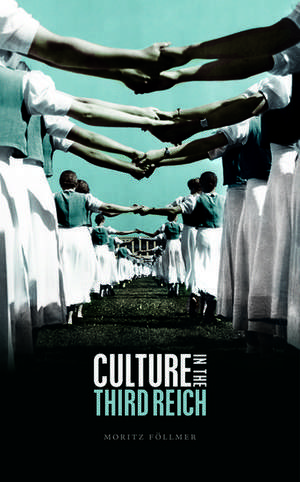Culture in the Third Reich
Autor Moritz Föllmeren Limba Engleză Hardback – 9 iul 2020
Preț: 137.84 lei
Preț vechi: 177.46 lei
-22% Nou
Puncte Express: 207
Preț estimativ în valută:
26.38€ • 28.64$ • 22.16£
26.38€ • 28.64$ • 22.16£
Carte disponibilă
Livrare economică 22-28 martie
Livrare express 18-22 martie pentru 67.53 lei
Preluare comenzi: 021 569.72.76
Specificații
ISBN-13: 9780198814603
ISBN-10: 0198814607
Pagini: 332
Dimensiuni: 142 x 224 x 31 mm
Greutate: 0.41 kg
Editura: OUP OXFORD
Colecția OUP Oxford
Locul publicării:Oxford, United Kingdom
ISBN-10: 0198814607
Pagini: 332
Dimensiuni: 142 x 224 x 31 mm
Greutate: 0.41 kg
Editura: OUP OXFORD
Colecția OUP Oxford
Locul publicării:Oxford, United Kingdom
Recenzii
[Föllmer] applies a sharp cultural lens to metropolitan life, politics and individual strivings and pastimes as the backdrop to disaster falling on Germany.
An impressively researched and steady-handed account ... Föllmer deepens our understanding of how National Socialism shook up the German psyche in a radical way but in such culturally conservative terms.
A fascinating work.
Culture in the Third Reich is readable and convincing. Engagingly and meticulously translated, it can only be recommended.
Hermann Göring is famous for supposedly having said, "When I hear the word 'culture', I reach for my revolver." In fact, the quote originated elsewhere. It would have been surprising if the case were otherwise, since the Nazis, being Germans, could hardly regard culture as something to be ignored or suppressed. Quite the contrary, they had their own complex and contradictory ideas about it - as [this] book explores in rich detail.
Moritz Föllmer's artful and nuanced study of culture in Nazi Germany explores a wide range of topics, including not only "official" Nazi culture as reflected in the work of Leni Riefenstahl and Albert Speer, but also subjects such as Jewish cultural life, the exile experience, and Nazi art plundering. Föllmer shows the myriad ways in which culture matteredfrom indoctrination and an effort to legitimize the war, to satisfying a desire for entertainment, among other reasons. Situating culture in the broader socio-political history of the Third Reich, Föllmer has produced a tour de force.
An impressively researched and steady-handed account ... Föllmer deepens our understanding of how National Socialism shook up the German psyche in a radical way but in such culturally conservative terms.
A fascinating work.
Culture in the Third Reich is readable and convincing. Engagingly and meticulously translated, it can only be recommended.
Hermann Göring is famous for supposedly having said, "When I hear the word 'culture', I reach for my revolver." In fact, the quote originated elsewhere. It would have been surprising if the case were otherwise, since the Nazis, being Germans, could hardly regard culture as something to be ignored or suppressed. Quite the contrary, they had their own complex and contradictory ideas about it - as [this] book explores in rich detail.
Moritz Föllmer's artful and nuanced study of culture in Nazi Germany explores a wide range of topics, including not only "official" Nazi culture as reflected in the work of Leni Riefenstahl and Albert Speer, but also subjects such as Jewish cultural life, the exile experience, and Nazi art plundering. Föllmer shows the myriad ways in which culture matteredfrom indoctrination and an effort to legitimize the war, to satisfying a desire for entertainment, among other reasons. Situating culture in the broader socio-political history of the Third Reich, Föllmer has produced a tour de force.
Notă biografică
Moritz Föllmer is Associate Professor of Modern History at the University of Amsterdam, and the author of a number of books and articles on identity and culture in twentieth century Germany, including most recently Individuality and Modernity in Berlin: Self and Society from Weimar to the Wall (2013).
